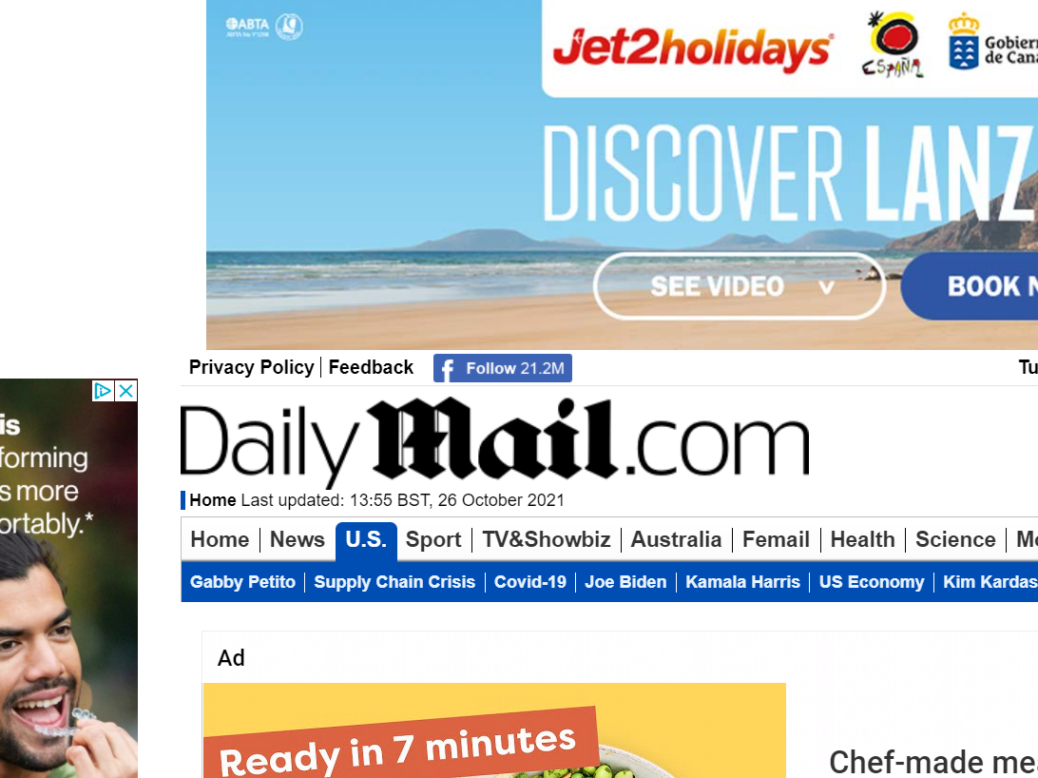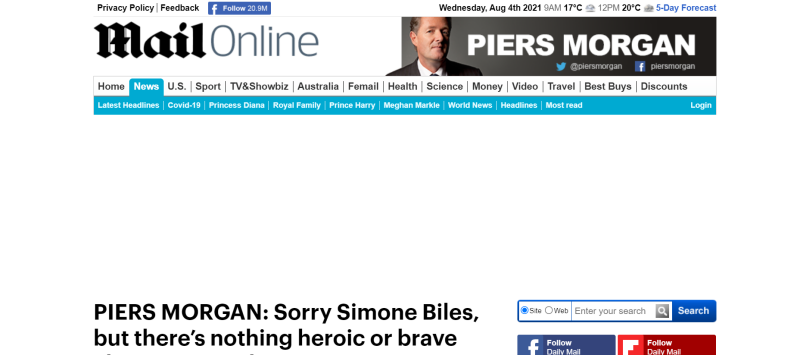
Google reimbursed Mail Online after turning off advertising on its US homepage for several hours over the “perceived presence of dangerous or derogatory content”.
Google turned off ad-serving on Dailymail.com, Mail Online’s US homepage, for four hours on 30 July – halting the site’s main revenue source.
Mail Online said it received no warning and then, when it became aware of what had happened and protested to Google, was told the ban was “due to the perceived presence of dangerous or derogatory content”.
“What this content was, we have no idea,” the publisher told Ofcom as part of its consultation into the future of media plurality.
According to Mail Online, Google then said it had “determined that the content did not fall under the scope of the policy” and reinstated ad-serving.
It blamed human error and reimbursed the lost revenue.
Mail Online is the 12th most popular news website in the US, according to Press Gazette rankings, and the second biggest in the UK after the BBC.
The incident came two days after Google removed advertising from a column by Piers Morgan slamming US gymnast Simone Biles for quitting Olympic events over her mental health.
[Read more: Google blocks ads on Piers Morgan’s Mail Online Simone Biles column over ‘racist comments’]
The tech giant initially failed to give an explanation but then said the decision had been taken because of “racist comments” under the article – also described as “dangerous or derogatory”.
“When challenged to produce examples it cited just one comment, which contained an obscure reference to freemasonry,” the publisher told Ofcom.
Advertising was still banned on the article three months later. Yesterday (Tuesday) the only advertising visible on the story was the Taboola paid-for content suggestion boxes directly under the article, but there were blank boxes to the top, right and left of the story including in the middle of the “don’t miss” sidebar.
However, after Press Gazette flagged the issue with Google, ads were visible on the story on Wednesday morning.
DMG Media complained that, because of Google’s dominance of the digital advertising market, this means no ads appeared at all, even if they were supplied through rival ad platforms.
The publisher said: “If Google had identified comments which had
otherwise escaped scrutiny and brought them to our attention, we would have been more than happy to deal with them.
“That has not happened, and the ad-serving ban remains in place, despite no reasonable explanation being given.”
[Read more: Reader comments, Google ad-blocking and the moderation dilemma for publishers]
Google referred Press Gazette to its policies for publishers, saying everyone must adhere to them regardless of their political leanings, affiliations or editorial stance and that everyone is notified of action against any of their pages via a policy centre.
DMG Media identified a third enforcement action from Google on 1 August when the platform said an “ad-serving disabled” label had been incorrectly applied, preventing around 10,000 ad requests from being served on Mail Online.
“Whilst this issue only impacted a small percentage of revenue, it again shows the high-handed approach that Google takes to blocking content from some publishers,” the publisher said.
DMG also revealed the Mail Online homepage in both the UK and US was classified as “brand unsafe” within Google’s buy-side ad platforms from the end of June.
“This has a very damaging effect on revenue, as many advertisers
instruct their agencies not to buy inventory on sites with a brand unsafe rating,” it said.
“Again, there was no warning or explanation. When we protested, we were told ad demand was light because it was July and the aftermath of Covid was
affecting ad demand generally.”
The publisher said these incidents “all show a cavalier abuse of
Google’s dominant position in the advertising market, driven by hostile
perceptions of Mail Online’s editorial content, which Google is either unwilling or unable to explain”.
It compared it to WH Smith deciding not to sell certain newspapers on its newsstands or pass on cover price revenues to publishers, but said the online equivalent was “more insidious because it is not obvious to users”.
“It is a blatant interference with editorial freedom and, when the digital
advertising market is dominated by one platform, it is also a very serious threat to media plurality,” DMG said.
“If Google decides for undeclared reasons that it does not like Mail Online’s editorial content and consequently blocks or severely restricts advertising, there is nowhere else to go. Because even non-Google ad demand is delivered through Google’s ‘pipes’, Google has no effective rival and its word is law.”
Google has argued the digital ads industry is highly competitive and that publishers have a huge amount of choice, referring to surveys that show the average large publisher uses six different platforms to sell ads on its site.
Google paid out more than £217m to the top five news publisher partners in its ad network between 2018 and 2020, it claimed.
Email pged@pressgazette.co.uk to point out mistakes, provide story tips or send in a letter for publication on our "Letters Page" blog


